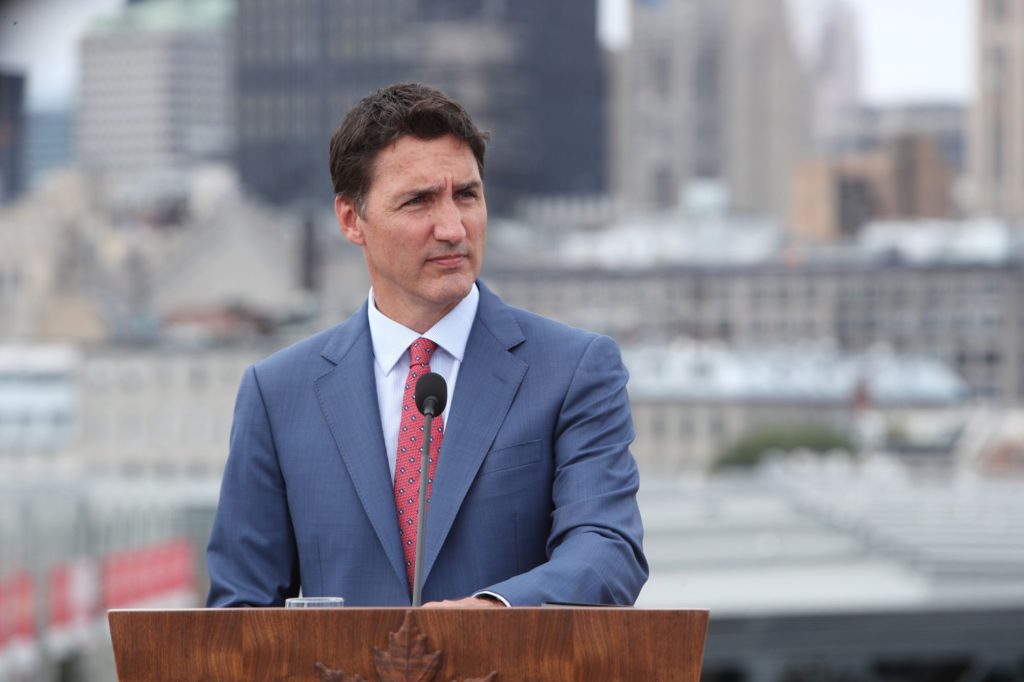Prime Minister Justin Trudeau is ending 2022 with a firmer grip on power in Canada, despite a year marked by angry protests against him, sky-high inflation and a falling housing market.
(Bloomberg) — Prime Minister Justin Trudeau is ending 2022 with a firmer grip on power in Canada, despite a year marked by angry protests against him, sky-high inflation and a falling housing market.
Even before columns of trucks blockaded the streets of Ottawa in February to challenge his government’s Covid-19 restrictions, speculation was simmering that Trudeau might leave after a lackluster election result.
The snap vote in September 2021 was his third as leader, and it’s been more than 100 years since a Canadian prime minister last won four straight elections. With Trudeau’s Liberal Party again short of a majority in the legislature, it was an open secret that some cabinet ministers were beginning to organize for a run at his job.
But instead it was the opposition Conservatives who turfed their leader, the party split by bickering over how to respond to the Covid protests, among other matters. Soon after, Trudeau signed a power-sharing deal with a left-wing rival that potentially staves off an election until 2025. Talk of the prime minister quitting has gone quiet.
It’s likely that a recession will be among the challenges he faces in 2023. Still, Trudeau has created political space for his government to concentrate on longer-term — and potentially legacy-building — goals like the energy transition.
“He is, in terms of his broad approval, in a stronger position than he started the year,” pollster Shachi Kurl said by phone from Vancouver. The latest survey by her firm, the Angus Reid Institute, shows 43% of respondents rating the prime minister favorably, up from 38% six months ago.
Kurl said the prime minister remains a polarizing figure, with strong disapproval ratings and a “fatigue factor” that will only grow the longer he governs. But she attributed Trudeau’s improved standing to his confident testimony last month at a public inquiry, where he justified his use of emergency powers to quell the convoy protests that shut down border crossings and paralyzed Canada’s capital city for more than three weeks.
“How many times has the prime minister been written off as a lightweight? But this was someone who was really coming off with a lot of gravitas,” Kurl said.
Trudeau isn’t out of danger yet. Canada’s economy is already slowing and downturns are are usually bad news for an incumbent prime minister, especially one in his eighth year of office.
With the central bank nearing the end of one of the most aggressive interest-rate hiking cycles in its history, households are feeling the pinch from borrowing costs that are four percentage points higher than they were in March. As a result, their net worth has fallen the most since 2008 as the housing market quickly cools.
Yet inflation — which peaked at a four-decade high of 8.1% in June but has since eased off to an annual pace of 6.8% — is also considered a government killer, and Trudeau has weathered it remarkably well so far. That suggests Canadians mostly blame global factors, according to Dan Arnold, who was the prime minister’s in-house pollster until last January and now works for Pollara Strategic Insights.
“I think the government will be judged based on how they respond to the crisis, as opposed to being blamed for causing it,” Arnold said by phone. “To this point, Canadians feel the government has done an OK job responding to it. But that could certainly change if things get worse, or if the government sounds like they’re out of touch with what people are going through.”
Trudeau also appears to have gotten a boost in facing off against a new foe: Pierre Poilievre, who won the Conservative leadership on a populist message that tapped into the frustration over vaccine mandates and other Covid restrictions.
Arnold said the prime minister is keen to highlight the contrast with Poilievre, an aggressive debater who frequently takes positions antithetical to the Liberal leader’s own values and beliefs. “Trudeau clearly has the energy and the fire in his belly right now, especially when he’s talking about Poilievre,” he said.
The incumbent team is also encouraged by a Dec. 12 by-election in a Toronto suburb that ended in a crushing 14-point victory for the Liberal candidate. The vote was in the sort of urban swing district crucial to winning national elections. And the result may also be a sign Poilievre has lost some traction now that Covid restrictions have mostly disappeared.
Marci Surkes, Trudeau’s head of policy until earlier this year, said she sees the prime minister entering a rare period of stability, thanks to his alliance with the New Democratic Party that allows the government to pass laws — and to the sense that Canada has finally turned the corner on the pandemic.
She expects to see Trudeau focus on more ambitious projects, particularly Canada’s transition away from fossil fuels and building up new green industries.
“My sense of things is that he very much wants to be able to drown out some of the noise for a time,” Surkes, now an adviser at consulting firm Compass Rose, said in an interview at Bloomberg’s Ottawa office.
The former top aide added with a smile that this was also the plan at the start of 2022 before events — including Russia’s invasion of Ukraine, which began within hours of Trudeau revoking the emergency powers that ended the convoy — intervened.
–With assistance from Erik Hertzberg.
More stories like this are available on bloomberg.com
©2022 Bloomberg L.P.










